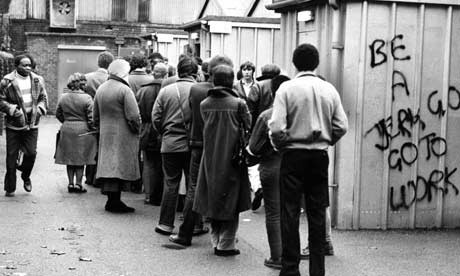UK recession longest and deepest since war, says ONS
Ratings agency Fitch says record budget deficit must be tackled to avoid UK debt downgrade
Gordon Brown received a twin blow today when a leading ratings agency warned Britain to get a tighter grip on its record budget deficit and figures revealed that the slump of the past 18 months was now officially the deepest since the second world war.
Fitch said that the UK – along with France and Spain – needed to "articulate more credible and stronger fiscal consolidation during the course of 2010 to underpin confidence in the sustainability of public finances".

A dole queue in Brixton in 1981. Fresh estimates show the current recession deeper than that in the early 1980s, with output down 6.03%. Photograph: Neil Libbert
Failure to do so, the ratings agency added, would greatly increase the chances of a debt downgrade, which would increase the cost of servicing the national debt.
The warning came within hours of data from the Office for National Statistics showing that Labour's attempts to boost growth took the edge off the recession in the third quarter but were not enough to prevent the slump extending into a record-breaking sixth quarter.
Confirmation that the UK is the only G20 nation still in recession sent the pound tumbling to a two-month low against the US dollar, with sterling dipping below the $1.60 level after the ONS announcement.
Ministers will now have to wait until the next set of growth figures are published in late January before receiving evidence that their attempts to boost activity have worked. Public investment in buildings helped provide the biggest boost to construction output for more than six years during the third quarter, while the "cash for clunkers" scheme led to a pick-up in demand for cars.
The City had been hopeful that recent encouraging news from the construction sector and for investment could result in the ONS revising away its estimate of a 0.3% drop in gross domestic product in the three months to September, but gloomier news from manufacturing and services resulted in only a limited reassessment.
Officials said they now estimated that the economy contracted by 0.2% in the third quarter following a drop of 0.7% in the three months to June. The ONS said that new data showed that the UK had performed worse earlier in the recession than originally believed, leaving the economy 5.1% smaller at the end of the third quarter of 2009 than it had been a year earlier.
Since the start of the downturn in early 2008, GDP has dropped by 6.03%, marginally worse than the 6% decline suffered during the deep manufacturing slump of 1979-81.
Shadow chief secretary to the Treasury, Philip Hammond, said: "This is disappointing news just before Christmas. Britain remains the last G20 country with a shrinking economy and we have now suffered the deepest and longest recession since the 1930s. Gordon Brown's claim to be leading the world out of recession rings increasingly hollow as the evidence mounts that his policies have failed. We need a change of direction to deal with our mounting debts, help keep mortgage rates lower for longer, and provide the confidence that the British economy is lacking."
Jonathan Loynes, chief European economist at Capital Economics, said today's GDP figures were "a touch disappointing" in the light of figures last week showing a sharp upward adjustment to investment in the third quarter prompted by a 10% jump in government capital expenditure.

No comments:
Post a Comment